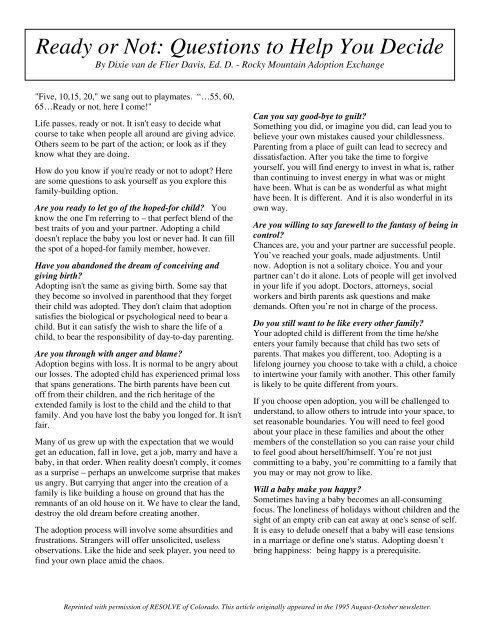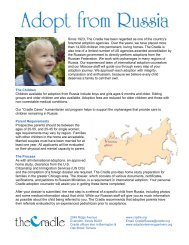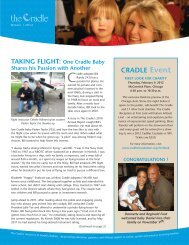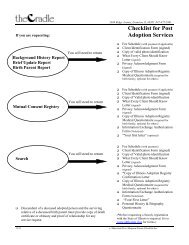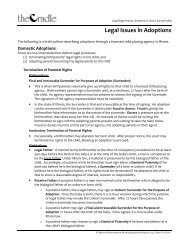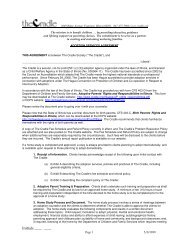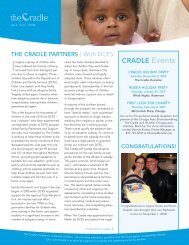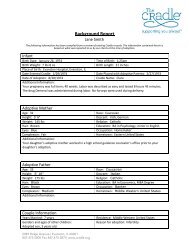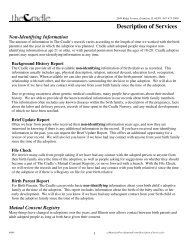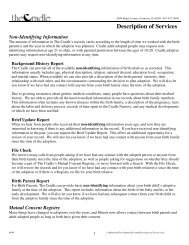Ready or Not: Questions to Help You Decide - The Cradle
Ready or Not: Questions to Help You Decide - The Cradle
Ready or Not: Questions to Help You Decide - The Cradle
You also want an ePaper? Increase the reach of your titles
YUMPU automatically turns print PDFs into web optimized ePapers that Google loves.
<strong>Ready</strong> <strong>or</strong> <strong>Not</strong>: <strong>Questions</strong> <strong>to</strong> <strong>Help</strong> <strong>You</strong> <strong>Decide</strong>By Dixie van de Flier Davis, Ed. D. - Rocky Mountain Adoption Exchange"Five, 10,15, 20," we sang out <strong>to</strong> playmates. “…55, 60,65…<strong>Ready</strong> <strong>or</strong> not, here I come!"Life passes, ready <strong>or</strong> not. It isn't easy <strong>to</strong> decide whatcourse <strong>to</strong> take when people all around are giving advice.Others seem <strong>to</strong> be part of the action; <strong>or</strong> look as if theyknow what they are doing.How do you know if you're ready <strong>or</strong> not <strong>to</strong> adopt? Hereare some questions <strong>to</strong> ask yourself as you expl<strong>or</strong>e thisfamily-building option.Are you ready <strong>to</strong> let go of the hoped-f<strong>or</strong> child? <strong>You</strong>know the one I'm referring <strong>to</strong> – that perfect blend of thebest traits of you and your partner. Adopting a childdoesn't replace the baby you lost <strong>or</strong> never had. It can fillthe spot of a hoped-f<strong>or</strong> family member, however.Have you abandoned the dream of conceiving andgiving birth?Adopting isn't the same as giving birth. Some say thatthey become so involved in parenthood that they f<strong>or</strong>gettheir child was adopted. <strong>The</strong>y don't claim that adoptionsatisfies the biological <strong>or</strong> psychological need <strong>to</strong> bear achild. But it can satisfy the wish <strong>to</strong> share the life of achild, <strong>to</strong> bear the responsibility of day-<strong>to</strong>-day parenting.Are you through with anger and blame?Adoption begins with loss. It is n<strong>or</strong>mal <strong>to</strong> be angry abou<strong>to</strong>ur losses. <strong>The</strong> adopted child has experienced primal lossthat spans generations. <strong>The</strong> birth parents have been cu<strong>to</strong>ff from their children, and the rich heritage of theextended family is lost <strong>to</strong> the child and the child <strong>to</strong> thatfamily. And you have lost the baby you longed f<strong>or</strong>. It isn'tfair.Many of us grew up with the expectation that we wouldget an education, fall in love, get a job, marry and have ababy, in that <strong>or</strong>der. When reality doesn't comply, it comesas a surprise – perhaps an unwelcome surprise that makesus angry. But carrying that anger in<strong>to</strong> the creation of afamily is like building a house on ground that has theremnants of an old house on it. We have <strong>to</strong> clear the land,destroy the old dream bef<strong>or</strong>e creating another.<strong>The</strong> adoption process will involve some absurdities andfrustrations. Strangers will offer unsolicited, uselessobservations. Like the hide and seek player, you need <strong>to</strong>find your own place amid the chaos.Can you say good-bye <strong>to</strong> guilt?Something you did, <strong>or</strong> imagine you did, can lead you <strong>to</strong>believe your own mistakes caused your childlessness.Parenting from a place of guilt can lead <strong>to</strong> secrecy anddissatisfaction. After you take the time <strong>to</strong> f<strong>or</strong>giveyourself, you will find energy <strong>to</strong> invest in what is, ratherthan continuing <strong>to</strong> invest energy in what was <strong>or</strong> mighthave been. What is can be as wonderful as what mighthave been. It is different. And it is also wonderful in itsown way.Are you willing <strong>to</strong> say farewell <strong>to</strong> the fantasy of being incontrol?Chances are, you and your partner are successful people.<strong>You</strong>’ve reached your goals, made adjustments. Untilnow. Adoption is not a solitary choice. <strong>You</strong> and yourpartner can’t do it alone. Lots of people will get involvedin your life if you adopt. Doct<strong>or</strong>s, att<strong>or</strong>neys, socialw<strong>or</strong>kers and birth parents ask questions and makedemands. Often you’re not in charge of the process.Do you still want <strong>to</strong> be like every other family?<strong>You</strong>r adopted child is different from the time he/sheenters your family because that child has two sets ofparents. That makes you different, <strong>to</strong>o. Adopting is alifelong journey you choose <strong>to</strong> take with a child, a choice<strong>to</strong> intertwine your family with another. This other familyis likely <strong>to</strong> be quite different from yours.If you choose open adoption, you will be challenged <strong>to</strong>understand, <strong>to</strong> allow others <strong>to</strong> intrude in<strong>to</strong> your space, <strong>to</strong>set reasonable boundaries. <strong>You</strong> will need <strong>to</strong> feel goodabout your place in these families and about the othermembers of the constellation so you can raise your child<strong>to</strong> feel good about herself/himself. <strong>You</strong>’re not justcommitting <strong>to</strong> a baby, you’re committing <strong>to</strong> a family thatyou may <strong>or</strong> may not grow <strong>to</strong> like.Will a baby make you happy?Sometimes having a baby becomes an all-consumingfocus. <strong>The</strong> loneliness of holidays without children and thesight of an empty crib can eat away at one's sense of self.It is easy <strong>to</strong> delude oneself that a baby will ease tensionsin a marriage <strong>or</strong> define one's status. Adopting doesn’tbring happiness: being happy is a prerequisite.Reprinted with permission of RESOLVE of Col<strong>or</strong>ado. This article <strong>or</strong>iginally appeared in the 1995 August-Oc<strong>to</strong>ber newsletter.
What do you expect the baby <strong>to</strong> be like?Adopting is not about having a baby; it's about raising achild. <strong>The</strong>y do not stay babies very long. Soon enoughthey are growing in<strong>to</strong> little people with geneticpredispositions, temperaments, learned attitudes. What doyou imagine that will be like f<strong>or</strong> you? How do you feelwhen you imagine living this out over the years?How do you define “woman,” “husband,” “wife,”“family”?Are you still a woman if you don’t have a baby? Can yoube an adequate husband if you are infertile? Each of uscreates our own definitions of man, woman, husband andwife as we live and contribute <strong>to</strong> our families. <strong>You</strong> mustdefine these f<strong>or</strong> yourself; what w<strong>or</strong>ks f<strong>or</strong> others might notw<strong>or</strong>k f<strong>or</strong> you.Do you know what love is?Love is not a feeling that comes over a person,psychiatrist/auth<strong>or</strong> Scott Peck says in his book <strong>The</strong> RoadLess Traveled. He says love is a committed, thoughtfuldecision. He contends that love is directing attention<strong>to</strong>ward our own and another's growth. It involves settingaside prejudices, frames of reference and desires, <strong>to</strong>experience as much as possible the loved one's w<strong>or</strong>ld. Itmeans extending ourselves in<strong>to</strong> unfamiliar territ<strong>or</strong>y,taking action in spite of fear.Genuine love requires us <strong>to</strong> see the other as having a<strong>to</strong>tally separate identity, separate from ourselves. In fact,love seeks <strong>to</strong> cultivate the individuality of the otherperson – even at the risk of separation <strong>or</strong> loss.Children most need parents who know how <strong>to</strong> love thatway. Many parents (whether by birth <strong>or</strong> adoption) fail <strong>to</strong>appreciate the uniqueness of their children. <strong>The</strong>y regardtheir children as extensions of themselves. If you areconsidering adoption, you are already contemplatingwhat it means <strong>to</strong> genuinely love another.This brings us <strong>to</strong> one last question:Do you choose <strong>to</strong> make the commitment <strong>to</strong> love a childconceived and b<strong>or</strong>n by others? <strong>The</strong>re are things you willnot know about your child, a part of his/her life youcannot share. <strong>You</strong> will not be able <strong>to</strong> choose the genepool <strong>or</strong> the influences in utero. <strong>You</strong> cannot control thecircumstances surrounding the relinquishment. This willbe a <strong>to</strong>tally separate individual from a different familytree.<strong>You</strong> can decide <strong>to</strong> commit <strong>to</strong> loving and nurturing thechild. <strong>You</strong> can commit <strong>to</strong> cultivating his growth in<strong>to</strong> hisown destiny. <strong>Not</strong> only will you make a decision <strong>to</strong> shareparenthood with strangers, in the case of an openadoption, but also you may be choosing <strong>to</strong> love thosebirth parents as well.<strong>Ready</strong> <strong>or</strong> not? In making a thoughtful decision onwhether <strong>to</strong> adopt, you make a commitment <strong>to</strong> your owngrowth. <strong>You</strong> resist the temptation <strong>to</strong> fill a role onceoccupied by another, and you find your own place.Dixie van de Flier Davis is the founding direct<strong>or</strong> of <strong>The</strong>Adoption Exchange, which connects waiting childrenwith adoptive families. She was a psychotherapist f<strong>or</strong>many years.Reprinted with permission of RESOLVE of Col<strong>or</strong>ado. This article <strong>or</strong>iginally appeared in the 1995 August-Oc<strong>to</strong>ber newsletter.


